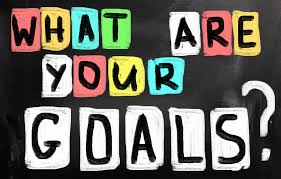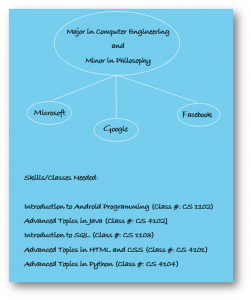In our last post, we talked about the importance of goal setting. Now it's time to introduce:
Four Steps to Effective Goal Setting
Step 1: Write down your academic interests. Ask yourself, what fields of study are you interested in? What classes did you take in high school that you would like to explore further in college? Were there any clubs that you participated in that could translate to an academic interest? For example, if you were a part of your high school’s robotics team, then maybe you would be interested in pursuing engineering. Try to connect your interests with possible academic majors. Take a piece of paper and jot down your interests and hobbies on the left side, and write down possible majors on the right side. Then, draw lines to connect your interests with possible majors.
If you wrote down multiple potential majors on the right side and are not sure about which one to pick, don’t worry! It’s okay to be interested in multiple fields of study. You are a unique person with a diverse set of interests. If you did write down multiple fields of study, then try to think about how you can combine these fields of study into a major/minor that combines both of your interests. For example, if you’re interested in engineering, computer science, and philosophy, you could major in computer engineering and minor in philosophy, or vice versa. You could even double major!
Step 2: Connect your major with a potential career. It’s never too early to start thinking about your potential career. Even if you’re a freshman in college, it’s good to ask yourself what career you would like to pursue after graduation. Nowadays, in order to be hired by a company, it’s recommended that you study something that is related to the field of your intended vocation. For example, if you want to work for a tech company, then it might be beneficial to study computer engineering in college.
Ask yourself, what type of industries are related to your potential major? If you’re majoring in computer engineering, then perhaps you might want to work in the tech industry. Research what type of companies exist within your industry of interest. For example, you might want to look at tech firms like Microsoft, Facebook, or Google. If you would like guidance on choosing potential careers, then consider taking a Myers Briggs test to learn about what type of careers fit your personality.
At this point in the exercise, you should have a general idea of what you want to accomplish. Try to write down a rough draft of your long-term goal. You can use the following template to help you get started:
I would like to pursue a major in Computer Engineering, with a minor in Philosophy. I believe that these fields of study will prepare me for a career in the tech industry.
Step 3: Identify the skills/classes that you will need to take to accomplish your academic and career goals.
To be successful in your intended career, you need to develop skills that are relevant to your industry. Recall Juanita’s goal. She wanted to be accepted into graduate school so that she could become a physics professor. In order to achieve her long-term goal, Juanita would need to take physics classes to gain an understanding of her intended field. In addition, she planned to conduct academic research and publish physics research papers with her professors. Through these activities, Juanita would be able to gain essential research experience, which would prepare her for a future career in academia.
Take a moment to reflect on the skills/classes that you will need to take in order to achieve your academic and vocational goals. For example, if you intend to work for a company like Google, then you will likely need to learn a few computer programming languages. You could list the computer science classes that you plan to take in college. In addition, you might also want to complete coding projects to gain experience. For example, you might want to create your own app. Write down these skills and classes on a piece of paper.
By listing the skills and classes that you need to take in order to succeed in your intended career, you’ve essentially identified how you’re going to accomplish your goals. Let’s build off of the template that we used in the previous page.
I would like to pursue a major in Computer Engineering, with a minor in Philosophy. I believe that these fields of study will prepare me for a career in the tech industry. In order to achieve these goals, I plan to learn four programming languages (Java, C++, Python, and SQL). In addition, I will create my own smartphone app so that I can gain relevant coding experience.
Step 4: Set short-term goals that bring you closer to fulfilling your long-term goal. Thus far, you’ve listed what you want to accomplish, and how you’re going to accomplish it. Now it’s time to add a timeline to our goals. Scientific research has shown that attaching a deadline to our goals helps to increase our productivity. Set up weekly and monthly short-term goals to keep you on track. For example, if you want to learn four new programming languages, then try to master one programming language every three months, you will have learned all four programming language within a year. If you want to create a smartphone app, then try to set a deadline for when you want to complete the app. For example, you might want to finish the app by the end of your sophomore year. Let’s incorporate what we’ve just discussed into our goal setting template.
I would like to pursue a major in Computer Engineering, with a minor in Philosophy. I believe that these fields of study will prepare me for a career in the tech industry. In order to achieve these goals, I plan to learn four programming languages (Java, C++, Python, and SQL) in one year (i.e. I will learn one new programming language every three months). In addition, I will create my own smartphone app by the end of my sophomore year so that I can gain relevant coding experience.
After completing these four steps, you should have a general sense of what your academic and personal goals are, how you’re going to accomplish them, and when you’re going to achieve them. It’s important to note that your goals may change over the course of your college career – and that’s perfectly okay! The purpose of setting goals is to introduce to you process of thinking of ahead. The famous author, Dr Stephen Covey, wrote that we should “begin with the end in mind.” We need to envision our destination before we can get there.
We’ve covered a lot in this post, let’s summarize the most important points:
- Setting goals can be simplified into four easy steps: Academic Interests -> Potential Career -> Identify Necessary Skills -> Set short-term goals that build up to your long-term goals
- Your goals can and will change, and that’s perfectly alright!
- Be ambitious with your goals, aim high and stretch yourself.
This concludes our two part series on effective goal setting. For more guidance on how to set effective goals, stay tuned for more posts!
-Jonathan A. Lu '19
References:
Covey, Stephen R. "Books - 7 Habits of Highly Effective People - Habit 2: Begin with the End in Mind." Stephen R. Covey. Franklin Covey, n.d. Web. 19 May 2017.




Pingback: Achieving Financial Goals: Strategies for Top 4 Success -